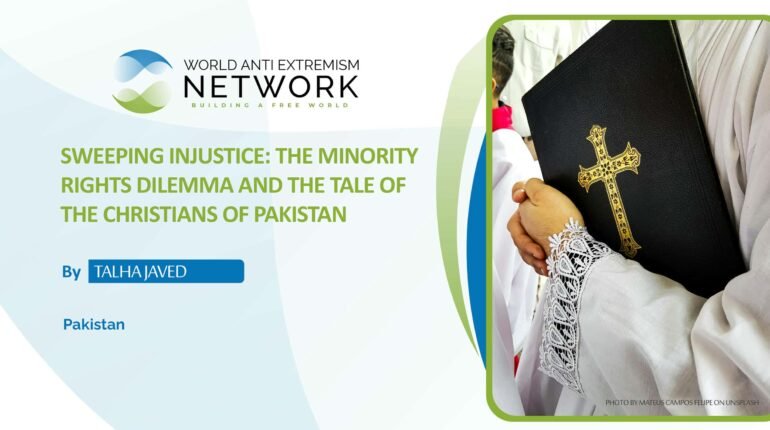Growing trends of Religious fanaticism in Pakistan; Penetration of Tehreek-e-Labaik Pakistan (TLP) in Khyber Pakhtunkhwa
- World Anti Extremism Network
- Growing trends of Religious fanaticism in Pakistan; Penetration of Tehreek-e-Labaik Pakistan (TLP) in Khyber Pakhtunkhwa

- Growing trends of Religious fanaticism in Pakistan; Penetration of Tehreek-e-Labaik Pakistan (TLP) in Khyber Pakhtunkhwa
- By Zohaib Hassan
- Nov 29, 2024
Share on:
Religious extremism in Pakistan has surged since 9/11, gaining momentum over time and increasingly drawing public support. It is imperative to understand and highlight blasphemy law being used as a tool to suppress dissenting voices and curb public discourse, the emergence of Tehreek Labaik Pakistan as a flag bearer of Sharia law, and how it has claimed a monopoly over all matters related to the honor of Prophet Muhammad (SAW) and how the movement has streamlined itself into the mainstream political arena. TLP’s agenda has also gained significant popularity within Khyber Pakhtunkhwa, and the consequences are evident.
1. Historical origin of the word ‘ Fanatic’:
This word is often used to describe unreasonable zeal and unwavering enthusiasm or notions on a subject. The word’s origin can be traced back to the British colonial era, when ‘Fanatics’ was perceived as a class that was existentially threatening and outside the realms of ‘politics’, ‘society’, and sanity. However, this term can be applied to describe the thought process of religious mobs that can do whatever it takes to achieve their ultimate goal.
2. Growth of Religious extremism in Pakistan:
A country with over 96% Muslim population, Pakistan has been facing the menace of religious fanaticism since its inception and the problem continues. In pre-partition India, there have been clashes based on spiritual ideologies between Muslims, Sikhs, Christians, etc, so this is not a new phenomenon but as we see it in the modern age, religious fanaticism has emerged as a challenge to safeguarding Human rights and ensuring individual freedom and political stability. The post-partition era presents an ironic picture because the country came into being on the grounds of demanding independence from the oppressive British Raj but is now turned into a religious intolerant society where space for minorities to exercise their basic human rights is drastically shrinking.
- Post-9/11 Trends: 9/11 served as an ideal breeding ground for religious fanaticism to bloom as Pakistan jumped into the US war on terror in Afghanistan. This move will continue to haunt Pakistan for decades as Pakistan has been turned into an abyss of religious extremism resulting in the curtailing of the human rights of civilians, journalists, foreigners, and minorities.
- Emergence of Tehreek-e-Labaik Pakistan (TLP): The state countered the problem of religious militancy by banning several extremist outfits, notably, one has emerged unaffected and has become a part of mainstream politics with popular support. TLP is a by-product of 9/11 and has gained noticeable trust within Barelvis ( a strand of Sufi Islam in South Asia). TLP Chief started the movement in support of Mumtaz Qadri; an elite policeman who killed Sitting Governor Punjab Salman Taseer in 2011 on the accusation of helping a Christian woman who was on death row facing false blasphemy charges and after this event, killings in the name of Anti-Blasphemy vigilante justice has emerged on the forefront. Later on, many high-profile assassinations took place and the Government dropped the idea of amending the blasphemy law. TLP secured approximately 2.2 million (4%) votes in the general election in 2018, making it the fifth-largest political party in Pakistan, a massive achievement due to its strong religious appeal.
- Blasphemy accusations (In numbers): According to a report published by the Centre for Research and Security Studies, 89 people have been extra-judicially killed based on blasphemy charges from 1947-2021. In total, 1504 have been accused of blasphemy out of which 1287 have been accused between 2011 to 2021 which is a worrisome figure. These figures explicitly highlight how prominently Blasphemy accusations have been used to curb dissent and to propagate a false image of Islam and also portray a negative effect on foreign relations.
3. Penetration of Tehreek-e-Labaik (TLP) in Khyber Pakhtunkhwa Province:
TLP’s massive voter turnout in the 2018 election was an evident hint of the changing public behavior and how the people believed that this hybrid outlet was a solution to their problems. TLP saw this opportunity and decided to expand its scope to KP.
Khyber Pakhtunkhwa province is dominantly inhabited by Pashtuns and has always been a volatile region and the people of this province have always been exploited with the religious card by different actors. After significant success in Punjab and other provinces, TLP shifted its focus towards KP and introduced itself to the dynamics of KP by deploying a few effective strategies. The conservative nature of KP’s populace coupled with deep-rooted religious values made a soft ground for religious fanatics to garner their roots. As we live in the digital era, social media shapes our thoughts and beliefs. TLP used social media as an opportunity to expand its circle and inculcate its beliefs in people’s minds, thus the targeted population is mainly youth charged with extremist tendencies. Hence there is little room for religious discourses and interfaith harmony, the people of Khyber Pakhtunkhwa buy those extremist views easily. Other political parties have failed to address people’s concerns while TLP uses force and street power to get their demands met, like gathering large negatively charged mobs, blocking main highways and roads, and burning and damaging public property, and every time the government seems helpless and at the end comply with their demands. In this process of polarization, both the party and the populace play their role, the party plays religious cards and rhetorical speeches to gain the youth’s support and the populace sees a sense of identity based on their shared beliefs because religion serves as a binding force between their members.
The main agenda of TLP is to monopolize the ‘Khatm-e-Nabuwat’ narrative and ensure their penetration in KP we have observed a surge in the cases of blasphemy allegations. The most recent was the mob lynching of a tourist from Sialkot was lynched in Swat KP this happened last month and there is still no evidence that he did. The ones who were accused were drug addicts after police investigated so this sums up the gruesome situation after TLP set foot in KP.
Conclusion:
To conclude, I have a few suggestions that can help mitigate the issue of religious fanaticism. There are hundreds of unregistered madaris (Religious schools) in Pakistan that are not registered so the Government should prioritize this subject matter, the curriculum taught should be verified by the religious council. Human Rights organizations across the globe should focus on playing a direct and positive role in catering to the needs of marginalized communities and ensuring that basic human rights are met. Pakistan; the state and the civil society need to reform and revise the existing policy dealing with this phenomenon.

About the Author
Zohaib Hassan is an accomplished professional with a Bachelor’s degree in Development Studies, from the Institute of Management Sciences, Peshawar. His diverse experience includes roles such as Academic Executive at CECOS College London and Student Affairs Officer at Rehman College of Rehabilitation Sciences. He has a proven track record of managing operations, coordinating admissions, and fostering international student engagement. Zohaib's tenure at PepsiCo as part of the ROSHANKAL internship highlighted his skills in project execution and teamwork. An esteemed graduate of the AMAL Academy fellowship, he has developed leadership and communication abilities, receiving accolades like the 'Most Thoughtful Project' award. Zohaib’s commitment to education is further demonstrated by his research on distance learning, and his numerous certifications reflect his dedication to continuous growth and development. Fluent in multiple languages, he is also an advocate for Human Rights, Sustainable development and community engagement.
The opinions expressed in these articles are solely those of the authors and do not reflect the views or positions of the organization. If you find any information incorrect, please contact (research@worldantiextremism.org), and we would be happy to assist you. You can download, distribute, and reuse this work, provided you credit the author and cite the original source.
Related Articles
Subscribe to our newsletter and stay updated.
Contact
Toronto, Ontario, M1L 0E5 Canada
Subscribe to our newsletter and stay updated.
Contact
Toronto, Ontario, M1L 0E5 Canada
Subscribe to our newsletter and stay updated.
Contact
Toronto, Ontario, M1L 0E5 Canada






